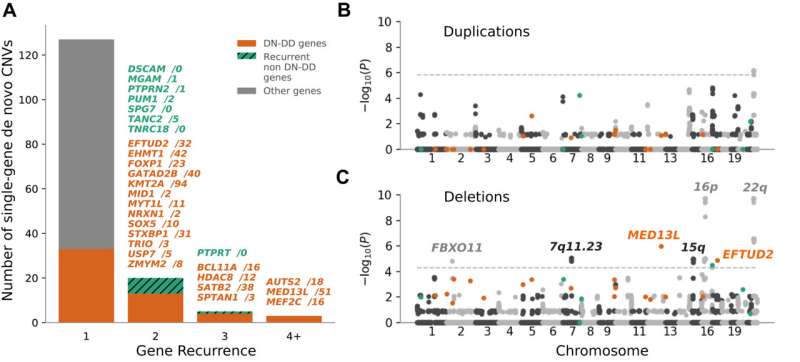This article has been reviewed according to Science X's editorial process and policies. Editors have highlighted the following attributes while ensuring the content's credibility:
fact-checked
peer-reviewed publication
trusted source
proofread
Single genomic test promises accelerated diagnoses for rare genetic diseases

A single genetic test could potentially replace the current two-step approach to diagnosing rare developmental disorders in children. This shift could enable earlier diagnoses for families and save the NHS vital resources.
Researchers from the Wellcome Sanger Institute, and their collaborators at the University of Exeter and the University of Cambridge, were able to reassess genetic data from nearly 10,000 families from the Deciphering Developmental Disorders study.
In a new study, recently published in Genetics in Medicine, they show for the first time that using exome sequencing—which reads only protein-coding DNA—is as accurate, if not better, than standard microarrays at identifying disease-causing structural genetic variations.
Its adoption offers hope for faster and more accurate diagnoses of rare genetic diseases. It could also deliver substantial cost savings for the NHS, though more training is needed for specialists to generate and analyze the data, say researchers.
Changes in our genetic code can range from single letter changes to the deletion or duplication of larger stretches of DNA. These bigger changes—called copy number variations (CNVs)—can be harder for clinical teams to detect in sequencing data and understand, which is why microarrays are used. While usually harmless, making up one of the major sources of genetic diversity in humans, these large-scale variations can sometimes cause various neurodevelopmental disorders, including Angelman syndrome, DiGeorge syndrome, and Williams-Beuren syndrome.
Currently, children suspected to have genetic diseases arising from these large deletions or duplications of DNA go through a lengthy process of testing and waiting for results from multiple diagnostic approaches, starting with a microarray test before progressing to a broader genome-wide sequencing test—such as exome or genome sequencing. In this new study, scientists set out to develop a single approach to detect these structural changes, using data available from genome-wide exome sequencing assays.
Using data from the Deciphering Developmental Disorders study, the team developed a single-assay approach that combined four algorithms using machine learning methods to analyze exome sequencing data.
Comparison of the new single-assay approach with current standard clinical methods revealed it could reliably detect 305 large-scale pathogenic mutations, including 91 not previously detectable using standard clinical microarrays. The findings suggest it could replace the current methods.
"Using exome sequencing data to detect clinically important large-scale changes, at the same time as small genetic variants, marks a significant step forward in making genetic testing simpler, cheaper and more accessible," says Caroline Wright, professor of genomic medicine at the University of Exeter, and author of the study
"Under the current system, children often endure a lengthy, step-wise process of different genetic tests before reaching a diagnosis. This research brings hope that, in the near future, families might only need one," says Helen Firth, professor of clinical genomics at the University of Cambridge, lead clinician and author of the study.
"We are still learning how large-scale genetic variations impact human health. This study proves that with the right computational methods, a single test can accurately detect them. Our findings support its widespread adoption in NHS clinical practice, and the adequate bioinformatics training to support this," says Professor Matthew Hurles, director of the Wellcome Sanger Institute and senior author of the study.
More information: Petr Danecek et al, Detection and characterization of copy-number variants from exome sequencing in the DDD study, Genetics in Medicine Open (2024). DOI: 10.1016/j.gimo.2024.101818




















